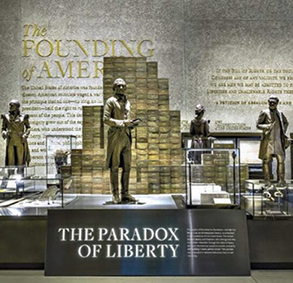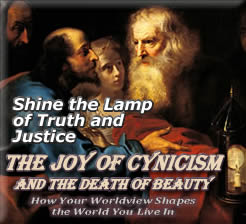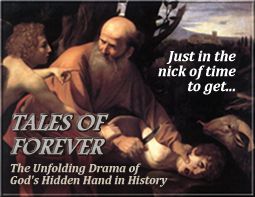The Paradox That is America
A New Wilderness Experience
America—the land of “one out of many”—is the very definition of a paradox. A land that’s unique yet universal, rooted in time yet timeless, born through an idea yet unleashed through technology. It began as a land sought out as a source of fabulous wealth and riches, a place that inevitably brought out the worst in mankind—greed, robbery, and murder. Yet, in time, it became a land sought out as a refuge for truth, justice, and freedom—a place that elevates the human soul to unparalleled heights.
What’s more, it’s a land that owes its existence to a people who were fleeing religious persecution, yet a land that could never have fulfilled its destiny had Americans not freed themselves from the darker aspects of the philosophy of those who spawned it.
It’s a land built upon an idea inspired by The Bible—as “a city upon a hill”—yet it would never have endured to this day if it hadn’t separated itself from the very idea that inspired it. A land that’s the fulfillment of some of the most important biblical promises concerning the destiny of the Earth, yet born of a promise that points to that future day when we’ll witness the appearance of a new Earth prepared as a bride beautifully adorned for her husband.
This is the story of the paradox that is America.
At the crossroads of history, where the English, Dutch, French, Spanish, Portuguese, Irish, Italians, Germans, Africans, and others came together in new ways, America was also a place that would rework and disarm the ancient conflicts of the Old World. Not unlike many New World civilizations, America was deeply scarred by racism, bigotry, and slavery, yet it never ceased to be the crucible where these universal ills were faced head-on and laid to rest in a uniquely American quest for “liberty and justice for all.”
Story Continues Below
Says Richard Price—the founder and CEO of Academia.edu—on his podcast In Depth With Academia:
On Earth as It is On Heaven: The Promise of America, Technology, and the New Earth is:
To hear Price’s book review of On Earth as It is On Heaven, CLICK HERE.
To hear Kent discuss the promises of God that pertain to God’s Kingdom on Earth, particularly as they pertain to the nations of the West, with Zen Garcia, the host of the Internet talk show Momentary Zen, CLICK BELOW.
Story Continues From Above
Unlike other nations whose origins reach too far into the past to offer any certainty about their origins, America is a land whose birth is so recent that it can be pointed to with historical precision. Yet upon further examination, America is also a land whose origins will reveal a far more ancient starting point than typically believed.
The first nation to be established merely on the foundation of an idea, America, because of a new way of acting upon ideas—born of the necessities of its time and place in history—is also a land that became synonymous with the spirit of invention, industry, and technology.
A land free to fully embrace the ideas of men like Locke, Montesquieu, and Williams, who provided new insights about how humane, just governments should act, it was also a place where those ideas could be reshaped as the need arose for this new society, forged out of a new wilderness experience called America.
Ironically, then, though we associate the Pilgrims with the spirit of religious freedom, the reality is they weren’t so much seeking freedom of conscience as they were seeking freedom from the abuses of the State-run Church in England.
Far from seeking religious independence for its own sake, New England Puritans soon began a similar politicizing of their new society, which was actually a continuation of the same societal forces that caused them to flee Old England in the first place. Had it not been for men and women of courage and enlightenment, in response to a new Puritan aristocracy, American history, with its special creed of freedom of worship and liberty of conscience, would have turned out much differently from the one we know today.
This, then, is the story of the paradox that is America.
It is the story of a people, and the story of all people; it’s the pursuit of a people, and the pursuit of all people, people who seek yet rarely find what they desperately seek—the freedom to think as they choose, the freedom to live as they choose, the freedom to be as they choose.
It is the story of a people who set out upon a timeless quest … in 1492 … in 1620 … in 1776.
It is also the story of another people, in a long distant past, a people who resided deep in the memory of those later people, who were just as eager, just as plagued by doubt as any who’ve ever wandered the face of the Earth.







